Items filtered by date: January 2024
Nerve Pain in the Ball of the Foot
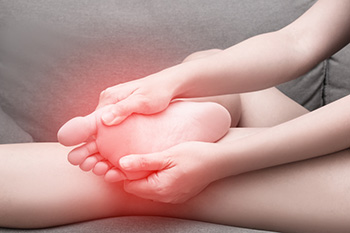
Nerve pain in the ball of the foot, often associated with a condition known as Freiberg disease, can be particularly distressing. This condition entails the necrosis of parts of the bones in the ball of the foot, typically affecting the second metatarsal head beside the big toe. Freiberg disease is common among girls experiencing rapid growth during puberty or others with specific bone length discrepancies. It is further aggravated by activities such as dancing, jogging, or running. Symptoms include pain during weight-bearing, especially when pushing off the foot, and stiffness and swelling in the affected joint. Diagnosis involves X-rays to reveal the necrotic changes in the bones. Treatment options for Freiberg disease range from non-invasive to surgical interventions. Changes in footwear, such as opting for low heeled shoes with thicker soles or rocker sole modifications, have proved beneficial. Additionally, custom orthotics that alter foot movement, can relieve pressure on the affected joints. In severe cases, surgery may be necessary. If you have pain in the ball of your foot that impedes your mobility, it is suggested that you schedule an appointment with a podiatrist for a thorough exam and diagnosis, followed by an appropriate treatment plan.
Neuropathy
Neuropathy can be a potentially serious condition, especially if it is left undiagnosed. If you have any concerns that you may be experiencing nerve loss in your feet, consult with Cory Brown, DPM from Cory Brown, DPM. Our doctor will assess your condition and provide you with quality foot and ankle treatment for neuropathy.
What Is Neuropathy?
Neuropathy is a condition that leads to damage to the nerves in the body. Peripheral neuropathy, or neuropathy that affects your peripheral nervous system, usually occurs in the feet. Neuropathy can be triggered by a number of different causes. Such causes include diabetes, infections, cancers, disorders, and toxic substances.
Symptoms of Neuropathy Include:
- Numbness
- Sensation loss
- Prickling and tingling sensations
- Throbbing, freezing, burning pains
- Muscle weakness
Those with diabetes are at serious risk due to being unable to feel an ulcer on their feet. Diabetics usually also suffer from poor blood circulation. This can lead to the wound not healing, infections occurring, and the limb may have to be amputated.
Treatment
To treat neuropathy in the foot, podiatrists will first diagnose the cause of the neuropathy. Figuring out the underlying cause of the neuropathy will allow the podiatrist to prescribe the best treatment, whether it be caused by diabetes, toxic substance exposure, infection, etc. If the nerve has not died, then it’s possible that sensation may be able to return to the foot.
Pain medication may be issued for pain. Electrical nerve stimulation can be used to stimulate nerves. If the neuropathy is caused from pressure on the nerves, then surgery may be necessary.
If you have any questions, please feel free to contact our office located in Lewiston, ID . We offer the newest diagnostic and treatment technologies for all your foot care needs.
Gait Analysis in Selecting Running Shoes
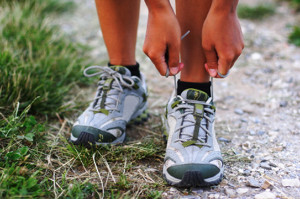
Gait analysis is a valuable tool for runners, regardless of their experience level. It helps runners understand their running style, which is essential for selecting the right shoes. The primary focus of gait analysis is assessing pronation, which is how the foot rolls during walking and running. Pronation acts as a natural shock absorber, distributing impact forces. Gait analysis matches pronation type with appropriate shoe types to counterbalance overpronation or under pronation, reducing injury risk and enhancing running efficiency. It helps choose between neutral or stability, supportive running shoes and identifies inefficiencies in foot, leg, and body movements that may lead to injuries or affect performance. Gait analysis can also identify other issues, such as slow cadence, heel striking, lack of core strength, and flexibility problems. Addressing these issues through strength-building, flexibility work, and proper shoe selection can prevent injuries and improve efficiency. If you are a runner or plan on embarking on running as a new sport, it is suggested that you schedule an appointment with a podiatrist for a gait analysis and recommendation for the proper type of running shoe for you.
If you are a runner, wearing the right running shoe is essential. For more information, contact Cory Brown, DPM from Cory Brown, DPM. Our doctor can provide the care you need to keep you pain-free and on your feet.
Choosing the Right Running Shoe for Your Foot Type
To increase performance and avoid the risk of injury, it is important to choose the right running shoe based on your foot type. The general design of running shoes revolves around pronation, which is how the ankle rolls from outside to inside when the foot strikes the ground.
- Neutral runners are able to choose from a wide variety of shoes, including minimalist shoes or even going barefoot.
- Runners who overpronate, or experience an over-abundance of ankle rolling, should choose shoes that provide extra motion control and stability.
- Runners who underpronate, or supinate, have feet that have high arches and lack flexibility, preventing shock absorption. They require shoes with more flexibility and cushion.
If you have any questions please feel free to contact our office located in Lewiston, ID . We offer the newest diagnostic and treatment technologies for all your foot and ankle needs.
Do You Suffer From Painful Feet?
Common Foot Injuries in Sports
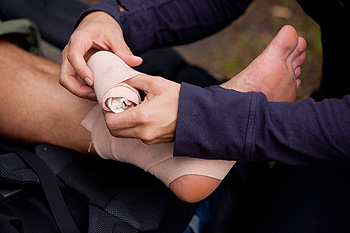
Common foot injuries in sports often result from the intense physical demands placed on the lower extremities. One prevalent injury is the ankle sprain, which occurs when ligaments surrounding the ankle are stretched or torn due to sudden movements or impacts. Athletes are also prone to stress fractures, particularly in the metatarsal bones, resulting from repetitive impact forces. Plantar fasciitis, another frequent ailment, involves inflammation of the tissue along the sole of the foot, causing heel pain. Achilles tendonitis, often seen in runners, is the inflammation of the Achilles tendon, causing discomfort and reduced mobility. Turf toe, common in sports played on artificial turf, is a sprain of the big toe joint. Athlete's foot is a fungal infection affecting many athletes due to shared locker rooms. Proper footwear, conditioning, and technique are essential in preventing these injuries. If you have a foot injury that you have sustained playing sports, timely diagnosis and appropriate treatment are vital, and It is suggested that you schedule an appointment with a podiatrist today.
Sports related foot and ankle injuries require proper treatment before players can go back to their regular routines. For more information, contact Cory Brown, DPM of Cory Brown, DPM. Our doctor can provide the care you need to keep you pain-free and on your feet.
Sports Related Foot and Ankle Injuries
Foot and ankle injuries are a common occurrence when it comes to athletes of any sport. While many athletes dismiss the initial aches and pains, the truth is that ignoring potential foot and ankle injuries can lead to serious problems. As athletes continue to place pressure and strain the area further, a mild injury can turn into something as serious as a rupture and may lead to a permanent disability. There are many factors that contribute to sports related foot and ankle injuries, which include failure to warm up properly, not providing support or wearing bad footwear. Common injuries and conditions athletes face, including:
- Plantar Fasciitis
- Plantar Fasciosis
- Achilles Tendinitis
- Achilles Tendon Rupture
- Ankle Sprains
Sports related injuries are commonly treated using the RICE method. This includes rest, applying ice to the injured area, compression and elevating the ankle. More serious sprains and injuries may require surgery, which could include arthroscopic and reconstructive surgery. Rehabilitation and therapy may also be required in order to get any recovering athlete to become fully functional again. Any unusual aches and pains an athlete sustains must be evaluated by a licensed, reputable medical professional.
If you have any questions please feel free to contact our office located in Lewiston, ID . We offer the newest diagnostic and treatment technologies for all your foot and ankle needs.
Red Feet in Elderly Individuals
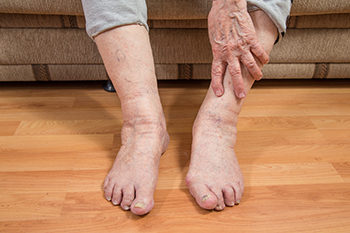
Red feet in the elderly can be a symptom with a myriad of potential causes. One primary contributor is reduced circulation, a common age-related issue that compromises blood flow to the extremities. Chronic venous insufficiency, where weakened veins struggle to return blood to the heart, may result in redness in the feet due to pooling blood. In some cases, medications or medical conditions affecting blood vessels can contribute to this discoloration. Additionally, inflammatory conditions like arthritis or infections might manifest as redness in the feet. Diabetic complications, particularly peripheral artery disease, may also lead to diminished blood supply and red discoloration. A podiatrist needs to conduct a thorough assessment to accurately diagnose and address the root causes of red feet in the elderly. If you or someone you know has this foot condition, it is suggested that you visit a podiatrist who can offer appropriate treatment options.
Proper foot care is something many older adults forget to consider. If you have any concerns about your feet and ankles, contact Cory Brown, DPM from Cory Brown, DPM. Our doctor can provide the care you need to keep you pain-free and on your feet.
The Elderly and Their Feet
As we age we start to notice many changes in our body, but the elder population may not notice them right away. Medical conditions may prevent the elderly to take notice of their foot health right away. Poor vision is a lead contributor to not taking action for the elderly.
Common Conditions
- Neuropathy – can reduce feeling in the feet and can hide many life-threatening medical conditions.
- Reduced flexibility – prevents the ability of proper toenail trimming, and foot cleaning. If left untreated, it may lead to further medical issues.
- Foot sores – amongst the older population can be serious before they are discovered. Some of the problematic conditions they may face are:
- Gouging toenails affecting nearby toe
- Shoes that don’t fit properly
- Pressure sores
- Loss of circulation in legs & feet
- Edema & swelling of feet and ankles
Susceptible Infections
Diabetes and poor circulation can cause general loss of sensitivity over the years, turning a simple cut into a serious issue.
If you have any questions please feel free to contact our office located in Lewiston, ID . We offer the newest diagnostic and treatment technologies for all your foot and ankle needs.
Definition and Risk Factors of Plantar Warts
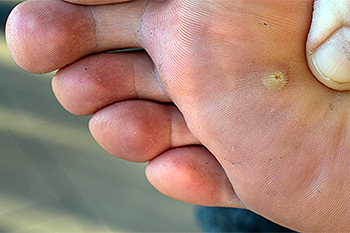
Plantar warts, small growths caused by the human papillomavirus, or HPV, often appear on the soles of the feet. Unlike common warts, which typically grow on the hands, plantar warts can be painful due to the pressure exerted on the soles when walking or standing. These warts may have a rough, grainy appearance with tiny black dots, which are actually clotted blood vessels. Several risk factors increase the likelihood of developing plantar warts. Close contact with the virus, such as walking barefoot in damp and communal areas like locker rooms, swimming pools, or public showers, can put your feet at risk. Additionally, those with a weakened immune system, such as individuals with diabetes or HIV, are more susceptible to plantar warts. Constantly moist or sweaty feet can provide an ideal environment for the virus to thrive. If you have developed a plantar wart, it is strongly suggested that you consult a podiatrist who can provide relief with appropriate treatment methods.
Plantar warts can be very uncomfortable. If you need your feet checked, contact Cory Brown, DPM from Cory Brown, DPM. Our doctor will assist you with all of your foot and ankle needs.
About Plantar Warts
Plantar warts are the result of HPV, or human papillomavirus, getting into open wounds on the feet. They are mostly found on the heels or balls of the feet.
While plantar warts are generally harmless, those experiencing excessive pain or those suffering from diabetes or a compromised immune system require immediate medical care. Plantar warts are easily diagnosed, usually through scraping off a bit of rough skin or by getting a biopsy.
Symptoms
- Lesions on the bottom of your feet, usually rough and grainy
- Hard or thick callused spots
- Wart seeds, which are small clotted blood vessels that look like little black spots
- Pain, discomfort, or tenderness of your feet when walking or standing
Treatment
- Freezing
- Electric tool removal
- Laser Treatment
- Topical Creams (prescription only)
- Over-the-counter medications
To help prevent developing plantar warts, avoid walking barefoot over abrasive surfaces that can cause cuts or wounds for HPV to get into. Avoiding direct contact with other warts, as well as not picking or rubbing existing warts, can help prevent the further spread of plantar warts. However, if you think you have developed plantar warts, speak to your podiatrist. He or she can diagnose the warts on your feet and recommend the appropriate treatment options.
If you have any questions please feel free to contact our office located in Lewiston, ID . We offer the newest diagnostic and treatment technologies for all your foot and ankle needs.

